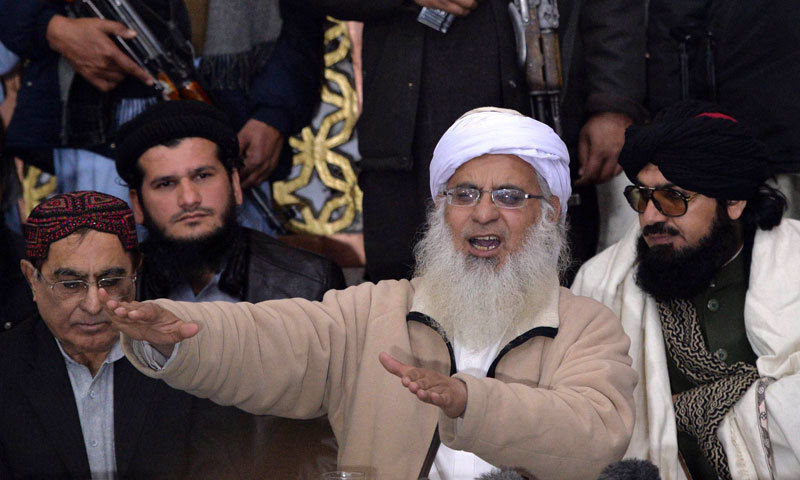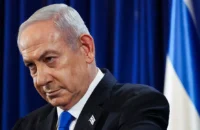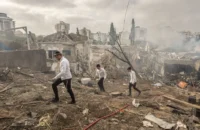By Noor Dhari
The Jihadist movement in Pakistan is not new, this ideology is now completely embedded in people’s minds, particularly children’s minds. There is a myth and misconception around the world that Madrasahs are the prime tool of generating the Jihadists ideology in Pakistan, while there was no doubt that Madrasahs played a very important role in spreading a Jihadi trend among the students. Madrasahs are one of the main causes of radicalisation but the real nurseries that induced Jihadists ideology were governmental schools (State schools).
In the early times, we had “Alif” for Anar (pomegranate) and “Be” for Bakri (goat) but later on it was replaced by “Alif” for Allah, “Be” for Bandooq (Gun), “J” for Jihad and “K” for Khanjar (Knife), this curriculum has been designed keeping child psychology in mind and these books have been distributed in different classes so that this religious ideological concept can be understood and remembered by the child.
“It is a fact of life that for every militant thrown up by the Madrasah, there are dozens who never went anywhere near a religious seminary. Instead, they were just plain criminals before they chose to join Jihadi network”, this was reported by the Herald Magazine, October 2003.
It is a very concerning issue for the country of Pakistan because there are around 72 Political Islamic organisations actively working only in Pakistan and 52 of them are banned by the Government of Pakistan. Punjab is the only province, which exported more than 90% terrorists from the country of Pakistan. Pakistan is a religious, ideological country, most people believe that religion is the only way to survive and rule. The nation of this country is primarily religious and emotional and their religious, political leaders can drag them from water to fire.
There are many religious organisations who are fighting each other in the race for power, status quo and charity funding. Charity is one of the main sources of religious organisations to run their network from the political ground to the terrorism growth.
In the election of 2002, MMA (Muttahida Majlis –e- Amal) the coalition of 6 religious parties won the election and formed the government in two provinces of Pakistan (KPK and Baluchistan). The main party in the coalition was JUI (F), Jamiat –e- Ulmah Islami (Fazaul Rehman), which was a pro-Taliban party, sent their students to Afghanistan to fight against the western coalition (NATO).
There are always very close ties between MMA and Military because without religious parties, the military of Pakistan cannot fulfill their dreams to rule in the south Asian via religious proxy groups. Since 1950, the Islamisation of Pakistan has been stronger not only by the religious parties, but by the mainstream political parties and military who have always used the religious card as an easy tool to gain public sympathy and secure legality for their power and regime. Religious and political parties always used Islam as a political tool to bring the nation together against their enemy such as India. Islam in Pakistan has become a political Islam to achieve political gains by the country’s powerful religious and political regimes.
Religious extremism and nationalist extremism has always been tied together by the nation of Pakistan, they will not go away without one another. As I stated before, Pakistan is an ideological country and religious extremism has remained its ideology. There has been always a space for the religious extremism in every political and nationalist parity of the country. The ex-President of Pakistan and the former chief of army staff General Pervez Musharraf played a double role with western coalitions, He fueled extremism in the country. He openly backed the religious parties to win the election of 2002 because he needed religious Mullahs in the power to build a pressure on the US and the NATO in Afghanistan. MMA was created by the strong support of Pakistan military to generate more extremists who can be exported to other countries, especially in Afghanistan to carry out terrorist acts. The MMA has maintained close links to the terrorist organisations and it once asked SSP (Sapah-e-Sahabah Pakistan), a Deobandi terrorist organisation to join the religious coalition. The military asked Jihadi organisations to join political religious parties in the coalition of MMA.
The united forum of religious parties gave the strength to Jihadi groups to emerge and start its violent struggle within the county against the minority community, such as Shia, Qadiyanis and other religious groups and across the border in India, Afghanistan and Europe. They have strong links with European terrorist organisations and in the investigation, it was proved that European terrorists visited tribal areas of Pakistan and got training at least once.
LEJ (Lashkar -e- Jhanghvi) a Sunni terrorist organisation was formed by the ISI (Pakistani intelligence agency) and United Jihad Council (UJC) is still active in a rural Punjab. After 9/11, the US pressured the Pakistani ruler, Mr Pervez Musharraf to imposed ban on national terrorist organisations and their leader, which he did, but later on, these terrorist organisations changed their names, their leaders were released and they participated in the country’s politics.
Pakistan’s Military is now playing a new game in Pakistan by sending their recruiters to join ISIS in Syria and Iraq. ISIS has gained strong roots in the country but Pakistani Government and Military are still hiding the facts. In fact, the Military needs a new religious power to keep the international community under pressure, Pakistan’s military never took serious steps to wipe out terrorist cells in the tribal areas, and it has never conducted military operations against the Haqani network in the tribal areas near the border of Afghanistan. In an interview, Pakistan’s security adviser to the Prime Minister, Mr Sartaj Aziz admitted that, “They will never carry out military operations against Jihadi groups who do not pose threat to the sovereignty of the country.”
The government sent a strong but uncooperative message through this statement to the international community that they will not carry on military operation against Haqani Network and other Jihadi groups who continuing their terrorist activities cross border. In 2015, Mumbai mastermind Maulana Zaki-ur-Rehman Lakhavi had been released from prison by the court orders. India, the US and the European countries condemned the release of the leader of terrorist organisation LeT.
Military and Mullah have always worked together to maintain their power in the country, no doubt, rural Punjab is the prime area to recruit military men and Jihadists from every home, one member of the family joined Pak military and one joined a Jihadi organisation. This trend shows the blood relation ties between Military and Jihadist Mullahs.
In a mid-year of 2015, Afghan – Taliban negotiations in Islamabad, Pakistan were nothing but a joke and the Pak administration tried to draw the international community’s attention from their bloody involvement in Afghanistan.
Pakistan never withdrew from the Afghan soul and they do not have any intention to leave the Afghan nation alone to decide their future. In the shape of the Taliban, the Haqani network and now ISIS, Pakistan needs to keep the Afghan government busy in combat with non-state actors.
Pakistan always indirectly interfered in Afghanistan through its non-state, proxy groups, but since the U.S left with its coalition forces (NATO) from Afghanistan, Pakistan again entered with direct involvement with its special forces run by the ISI (Inter-services intelligence) special unit.
In the province of eastern Paktia – Afghanistan, around 600 Pakistani Special Forces along with non-state actors were fighting with the Afghan forces. It is confirmed that Pak military is again supporting the insurgency to de-stabilise Afghanistan.
It is recently reported in the TOLO news (Afghan News) that a senior official of inter-services intelligence (ISI) is leading the battle against Afghan security forces in the Samkanai district of Paktia.
Pakistan’s intelligence agency again playing the same game to distribute money among the people as they did in the times of the Taliban. This time, they have offered around six million reward in Pakistani currency for breaking the Front-line against the Afghan security forces.
There are some speculations in Pakistan that dead bodies of ISIS from Syria are coming to Gujrat, Mandi Bahaudin and Karachi to KPK. It was already reported that ISIS has recruited thousands of followers from Af-Pak and now NATO commander Gen. John Campbell has confirmed that ISIS is recruiting in Afghanistan and Pakistan.
The international community has never trusted Pakistan’s intelligence agencies because they know, even the Army Chief is sincere in crackdown of militants and their organisations, but if ISI does not comply, nothing can be changed. The example was already available, when Musharraf banned militant organisations and locked their leaders under US pressure, ISI got released few days after.
Musharraf made a policy on 12th Jan 2002, banning some militant groups but released them a few days later, even Hafiz Saeed of LeT and Maulana Masood Azhar of JEM, but both were back in circulation after a short time of detention.
An American reporter said: “It is not clear whether he (Musharraf) can exert full control over them or whether the militants will continue to receive a backing of parts of Pakistan’s intelligence service that hold the Kashmir cause dear”.
Pakistan has invited another problem by sending their own people into war zones in Syria and Iraq. There are many proofs that Shia Pakistani community travelled to Syria and Iraq to fight alongside with President Assad’s security forces. It has been now confirmed that those Pakistanis who died in fighting in Syria and Iraq are buried in different cities of Iran.
Iran’s media covers large funerals held in Iranian cities usually attended by local religious officials and those killed were titled as “Defenders of the Sayedah Zainab shrine”.
Also, Sunni militants of Pakistan travelled to Syria and Iraq to fight with ISIS. The organisation of Tehrik Taliban Pakistan (TTP) has confirmed that its fighters have arrived in Syria and established their command and control to operate militant operations with ISIS. Abdul Rashid Abassi, the spokesman of TTP in 2014 stated in the media that:
“Their 120 fighters are ready to join IS in Syria and it is the second batch to join, they also claimed their Arab fighters have requested them to help and their hundreds of fighters were prepared to go” Al Jazeera Reporter said from Islamabad.
Another growing issue highlighted by Pakistan’s security services that in Sindh (Province of Pakistan) about 40 religious seminaries have contacted local terrorist organisations. The security report of seminaries was presented recently in the Apex committee headed by CM (chief Minister). It was mentioned in a report that so far approximately 160 seminaries which belonged to the Salafi and Deobandi sects have been sealed. The report says, there are about more than 9500 religious seminaries are active in the province and 6503 of them registers with the government and the rest of 3087 are unregistered.
In the province of KPK approximately 143 Madrasahs are considered highly sensitive in terror connections. The National internal security policy released a report in 2014 and stated that about 22,000 Madrasahs are involved spreading extremism around the country.
At the time of creation of Pakistan in 1947, there were about 189 Madrasah in a country but by 2008, they were estimated around 40,000 actively working in the country of Pakistan and they were greatly expended during and after the period of Gen Zia –ul- Haq.
Pakistan is becoming a tough country again for the rest of the world and it needs to stop the religious radicalisation within the country. The Inter-service intelligence (ISI) should be scrutinised by the parliament for their unlawful activities within and across borders the country. Pakistan has fought a long tired war against terrorism, however, Pakistan’s intelligence services breed these organisations to achieve their political ends and it needs to be considered seriously.



























